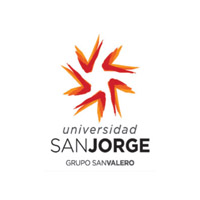
Founded in 2005, San Jorge University (Zaragoza, Spain) is a non-profit foundation that currently has about 3,000 students. Despite its youth, it has not stopped growing by increasing its academic offer, ranging from the Social Sciences (Journalism, Advertising and Public Relations, Translation and Intercultural Communication) to the Health Sciences (Nursing, Pharmacy, Psychology) or Technology (Architecture and Computer Engineering), among other undergraduate and postgraduate degrees.
Its objectives include the training of well-prepared professionals for the 21st century labor market, accustomed to problem solving and teamwork, with good management of technological tools; all this without neglecting education in terms of human values. The team is young and dedicated to innovative teaching and personalized attention to students. In the field of interculturality, USJ welcomes a large number of foreign students each year, representing overall a very significant percentage of its students. In addition to the aforementioned degree in Translation and Intercultural Communication, the research group on “Migrations, Interculturality and Human Development” studying such issues, is obtaining remarkable results in terms of publications, financing and participation in national and Europeanprojects.
Regarding LIFE-TWO project, it’s worth mentioning that about 15% of the population in Spain is of foreign origin, especially present in the educational stage. Within two decades, Spain has become from being a country that emits emigrants to one that receives immigrants, just like other southern European countries. This reversal in the flows of people, who come with their respective cultural and religious baggage, represents a social challenge that must be urgently addressed, starting from education.
Therefore, the LIFE-TWO project is of special interest, as it will provide tools to the education professionals, who must respond to situations for which they have not received necessary training, as well as to exchange points of view on the matter, allowing the promotion of new approaches that facilitate intercultural coexistence and a more inclusive and respectful society.
